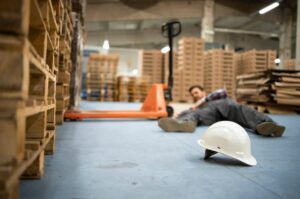Negligence in a Slip and Fall Case
If you’ve been injured in a slip and fall accident due to someone else’s negligence, you will need to compile evidence to prove that the other party failed to take due care. To prove negligence, you can use photos, videos, and witness statements, among other things. However, it is important to understand the definition of negligence in California, especially as it pertains to specific locations. A Los Angeles personal injury attorney can determine how to prove negligence in the specific circumstances of your own slip and fall case.
How Can I Prove Negligence in a Slip and Fall Case?
Evidence from the accident scene is critical for proving negligence in a slip and fall case. The following evidence can help you prove negligence when filing your claim:
- Photographic evidence: Take photos or video of the scene at the time of the accident before anyone can make changes.
- Documentary evidence: Thoroughly document the accident, including dates, times, and any details regarding who was at fault. Obtain copies of any police reports or other documentation of the accident, if available.
- Witness statements: Ask witnesses for contact information. You don’t have to take a statement right away, as your attorney can do that while you recover.
Duty of Care for Different Property Types
To prove negligence in California, you must be able to establish that the company or entity responsible for the property where your slip and fall accident occurred had a duty to ensure the safety of people at the location. This duty of care can differ depending on the characteristics of the property.
Residential Property
Residential properties include apartment complexes, condominiums, residential communities, and single-family homes. A condo, apartment, or other residential community usually has a management company or board responsible for maintaining the common areas, including common parking areas, common lawns, and courtyards. They have a duty of care to ensure that these common areas are safe for reasonable use as intended.
Commercial Property
Commercial properties include businesses, warehouses, and other properties not used for residential purposes. They can also include institutions like schools, churches, and hospitals. The owners and managers of such facilities have a duty of care to ensure that the locations are kept safe for patrons, visitors, students, and other individuals who reasonably use the property.
Recreational Property
Recreational properties, whether privately or publicly owned, are properties specifically designed for recreational activity. According to California GOV § 831.7, recreational properties are not liable for injuries that occur to individuals engaging in hazardous recreational activities, such as swimming and diving, mountain biking, four-wheeling, white water rafting, rock climbing, waterskiing, and surfing. In engaging in such activities, the law states that the participant is or should be reasonably aware of the hazards associated with the activity.
That said, certain individuals or organizations can still be held liable for injuries that occur on recreational property under certain circumstances. Your Southern California slip and fall attorney can explain the duty of care required for different property types and outline the ways these distinctions may affect your case.
What is Negligence According to California Law?
California Civil Code § 1714 states that anyone who causes injury to another person through a willful act or a lack of ordinary care can be held liable for their actions. Such actions are considered negligent, especially when the person acts carelessly or recklessly.
For slip and fall accidents, someone could be found negligent if they created a dangerous condition or allowed one to exist without making a reasonable effort to mitigate or correct the condition. According to California Government Code § 830 (a), a dangerous condition poses a “substantial risk of injury” to individuals using the property with due care as intended.
How Common Are Slip and Fall Injuries?
According to the National Floor Safety Institute (NFSI), 21% of emergency room visits each year are due to falls. This means that over a million people annually suffer from injuries due to slip and fall accidents in the U.S. While individuals over age 65 are more prone to such injuries, slip and fall accidents can happen to anyone.
Slip and fall injuries can occur anywhere, whether you’re at home, at work, buying groceries, or enjoying a park. It should not be your responsibility to pay for costs associated with injuries due to someone else’s negligence. A personal injury attorney with experience handling injury cases in Southern California can help you seek compensation for your injuries.
Who is at Fault in a Slip and Fall Accident?
Proving fault in a slip and fall accident requires a thorough understanding of the accident timeline, the parties and entities involved, and the location in which the accident occurred. To sue for negligence in your slip and fall accident, you must prove that:
- The responsible party had a duty of care to prevent slip and fall hazards
- The responsible party failed in that duty of care, whether willfully or by mistake
- As a result of the responsible party’s failure in their duty of care, you suffered a slip and fall accident
- You were injured and suffered material losses as a result of this accident
How Can a Los Angeles Personal Injury Attorney Help With My Slip and Fall Case?
If you or a loved one has suffered an injury in a slip and fall accident, the personal injury lawyers at KJT Law Group can help. Our skilled personal injury lawyers in Los Angeles can explain how to prove negligence with the specific circumstances of your slip and fall case and outline the requirements necessary to establish and pursue your claim. Contact our legal team today for a free consultation or call (818) 507-8525.



